The installation of a roof railing is a crucial safety measure to prevent falls from rooftops. The roof railing's design greatly influences the safety of those working or spending time on the roof. In addition, a well-made roof railing improves the building's architectural appeal.
Several roof railing designs are on the market, including those made of aluminium, steel, glass, and wood, each with special characteristics and advantages. The numerous facets of building railing design will be covered in this topic, including the topic of how high the railing should be for the roof and what should the minimum railing distance be.
Recommended Reading
18 Roof Railing Design Ideas in 2025
Given below are 18 unique modern roof railing designs.
1. Steel Railing Design
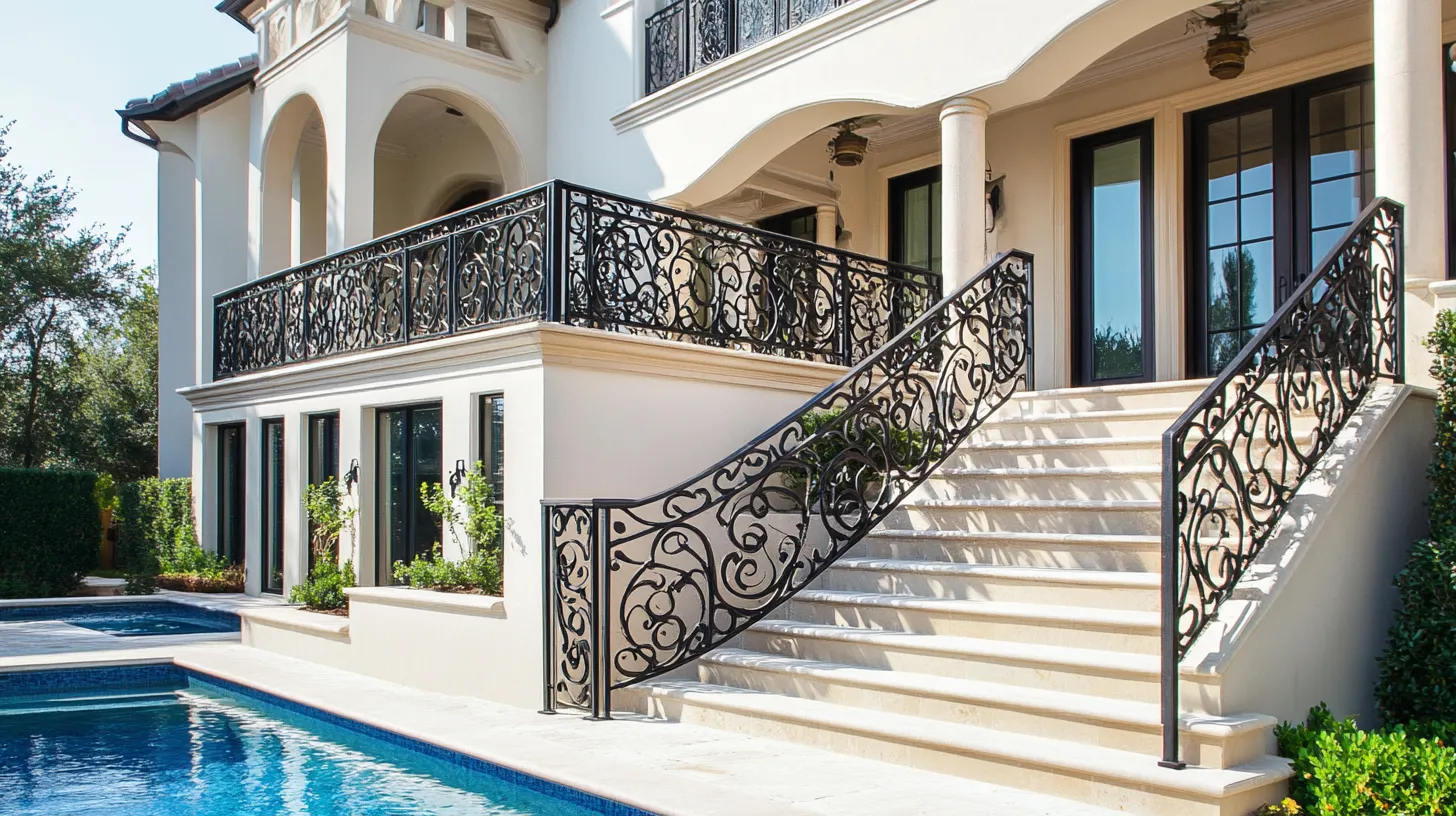
Because of their strength and longevity, steel railings are a popular roof option. Steel railings may be made to match the structure's style and can have different coatings applied to them to stop corrosion.
The steel railing design can range from plain and straightforward to elaborate and detailed, depending on the structure's architectural style. A steel railing can also be used with elements like glass or wood to provide an original and striking design.
2. Design of Cable Railings
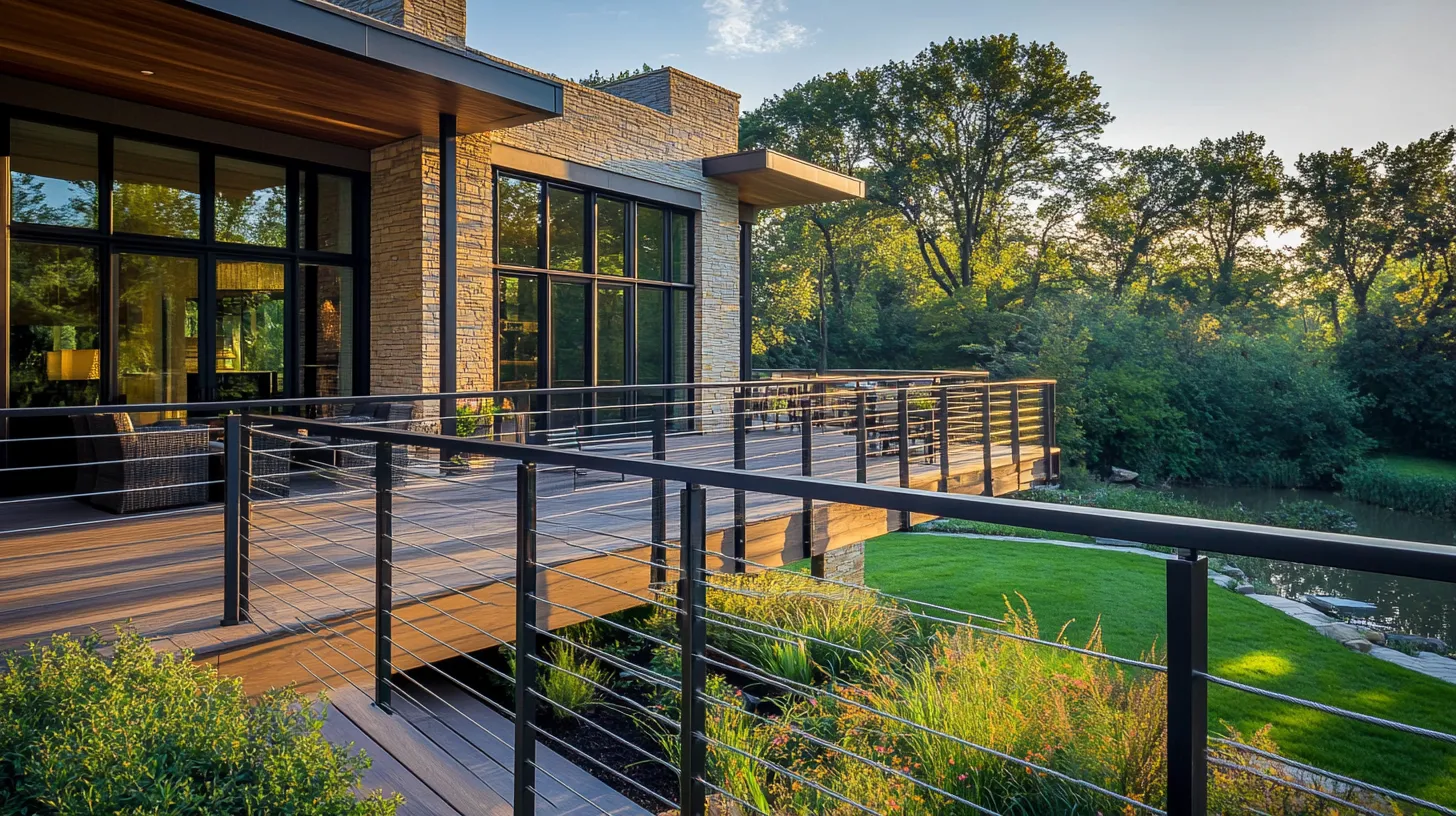
Cable railings have a sleek, contemporary look ideal for modern structures. They are constructed from metal wires suspended between vertical pillars, giving a clear view of the surroundings. Cable railings are a common option for rooftop decks and terraces since they are portable and simple to install.
3. Floral Motif Railing Design

Adding a flower motif railing design to a rooftop is a beautiful approach to make it more abundant and charming. These railings can be manufactured from various materials, such as steel or wrought iron, and feature exquisite floral designs. In addition, they provide a traditional design that may go with contemporary and historical structures.
4. Design of Curved Stainless Steel Railings
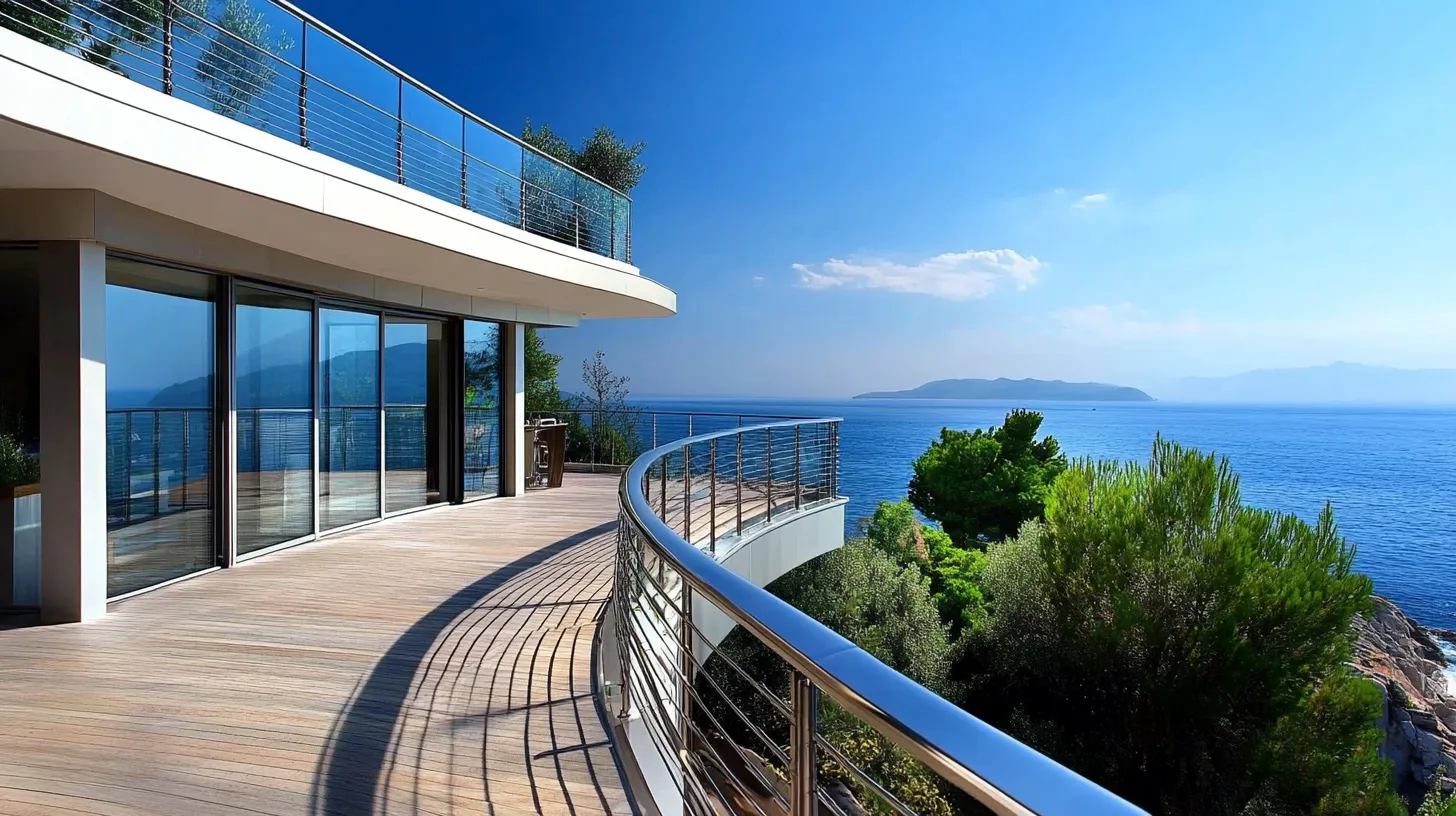
Curved stainless steel railings provide a distinctive and creative style that gives any rooftop a touch of refinement. These stainless steel railings are built with curved and flowing lines that give them a sophisticated appearance. For a clear view of the surroundings, glass panels can be used with curved stainless steel railings.
5. Glass and Steel Railing
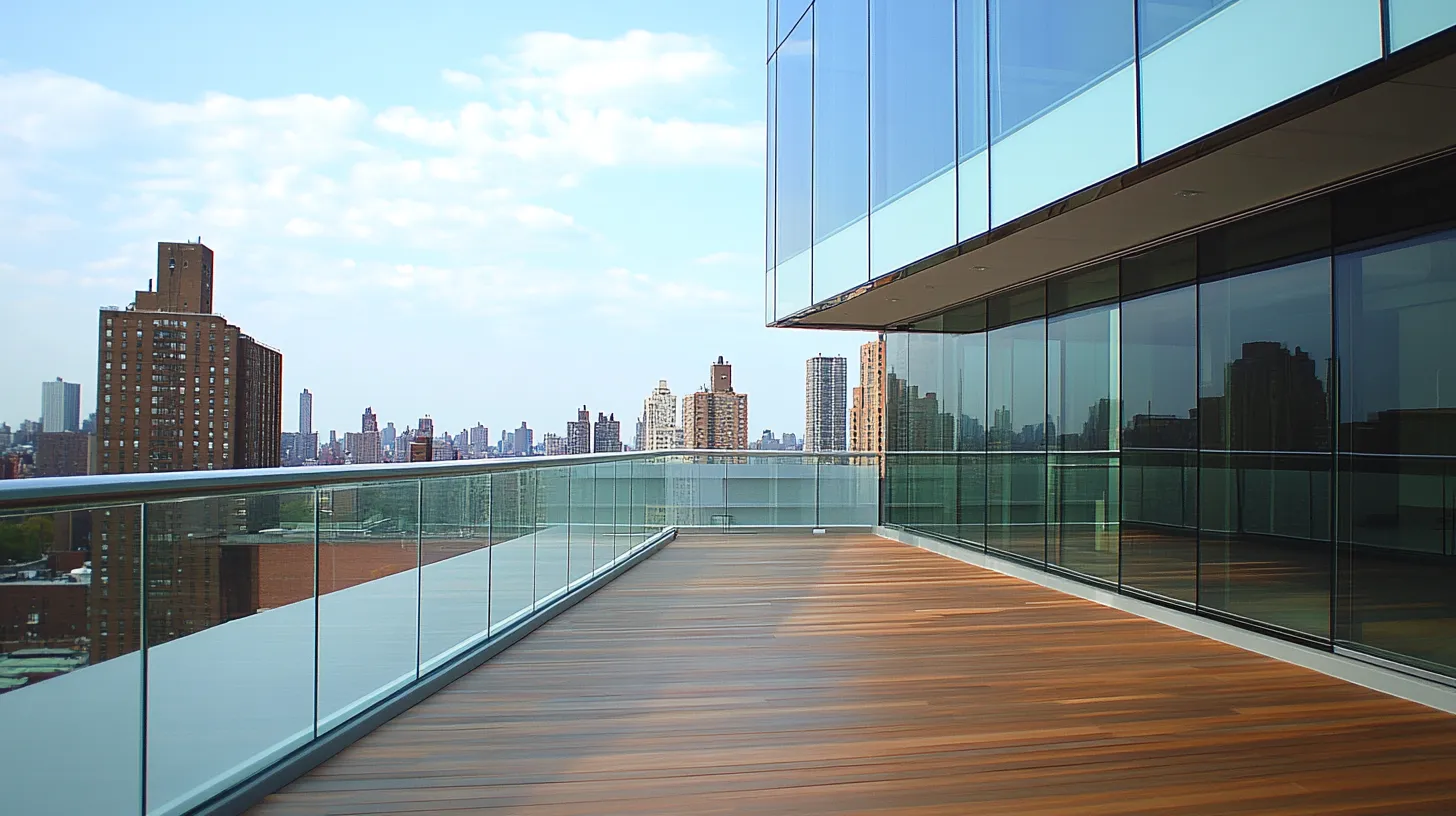
Glass and steel railings create a sleek, modern appearance on rooftops with beautiful vistas. Steel adds strength and durability, while the mix of glass and steel gives the space a feeling of openness and airiness. Glass panels can be coloured or frosted to increase privacy, and they can be mixed with different steel patterns to produce a distinctive and personalised appearance.
6. A Modern Minimalist Railing Design
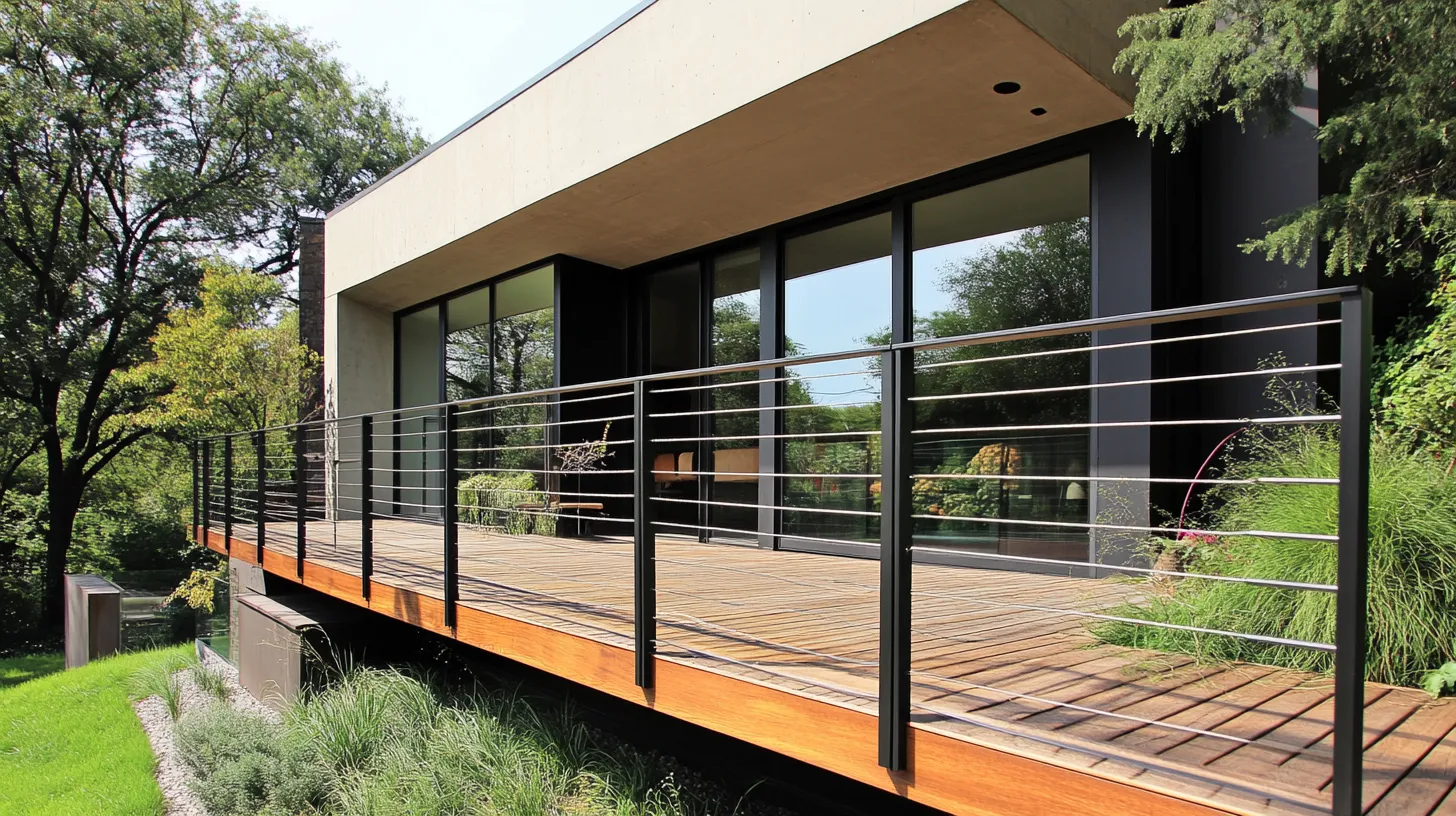
It is ideal for individuals who appreciate a neat, uncomplicated appearance. These railings are typically made of materials like steel, glass, or cable and are composed of straight lines and geometric shapes. Because of their straightforward construction, these railings have a contemporary, uncomplicated appearance that blends perfectly with their surroundings.
7. Design of Wrought Iron Railings
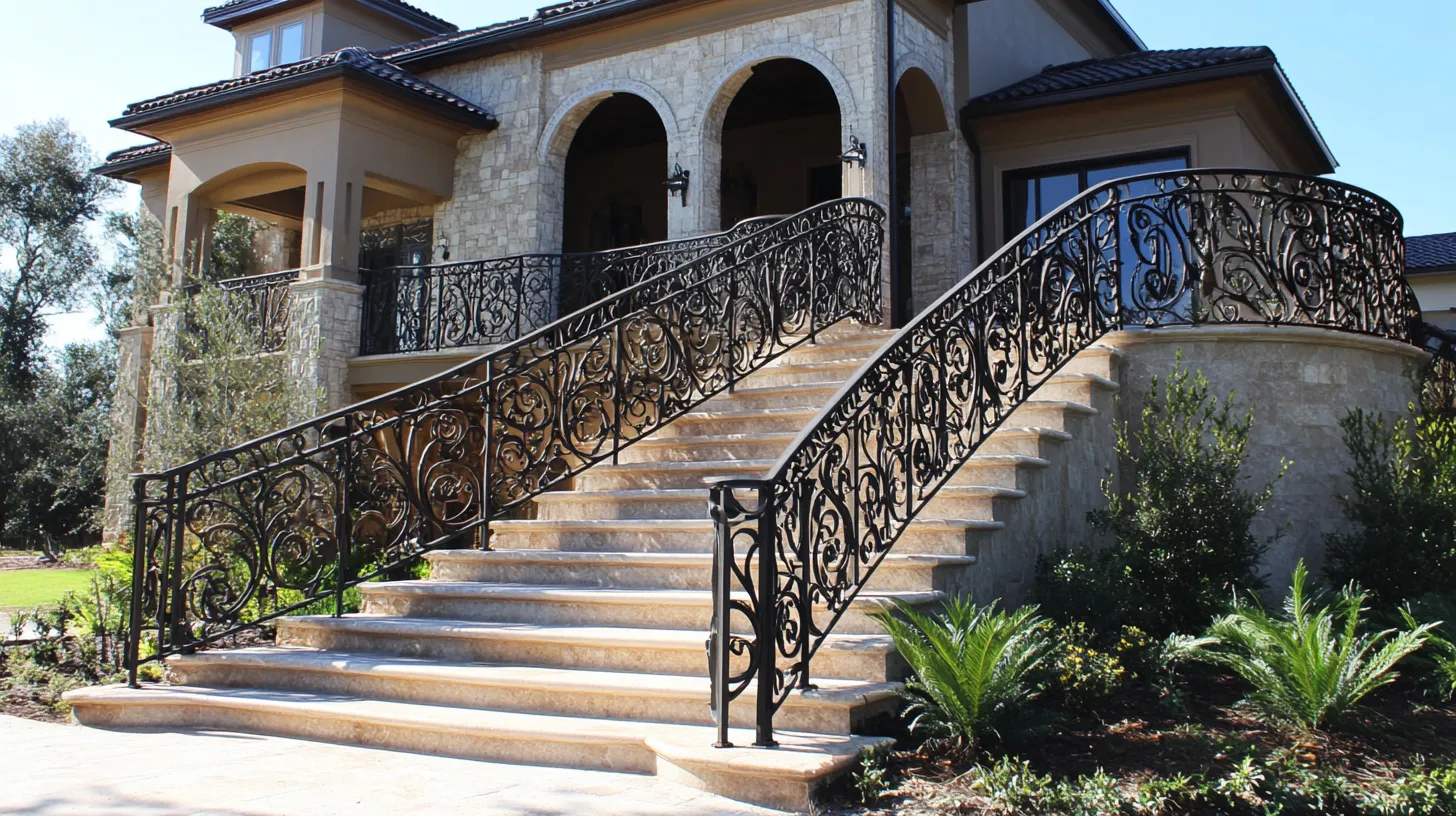
Wrought iron railings are a traditional roof railing option because of their timeless attractiveness and durability. Iron is heated and shaped to form elaborate motifs during the construction of these railings. Wrought iron railings can be created in several designs and coated with various finishes to avoid rust and corrosion.
8. Horizontal Railing Design
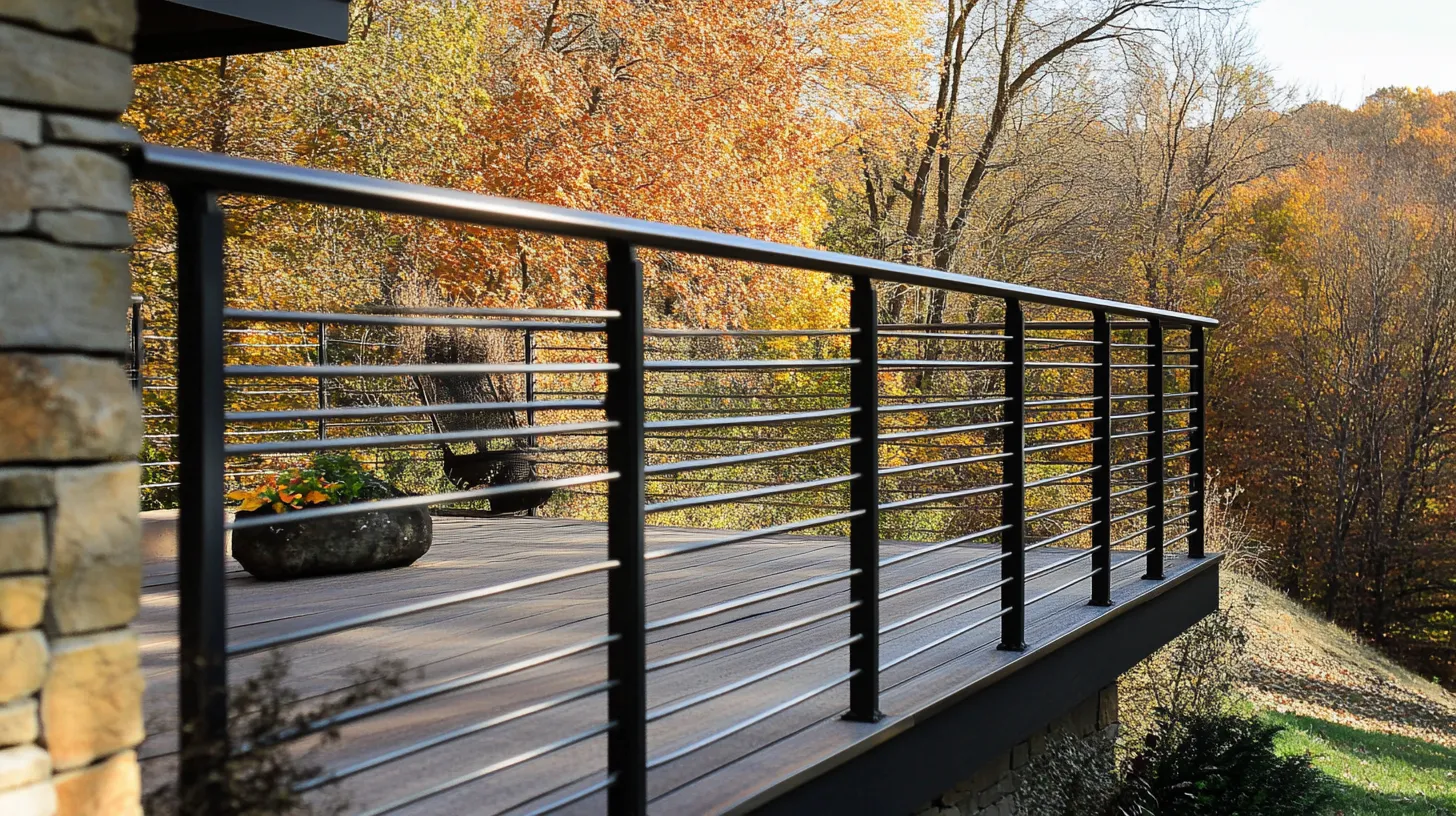
Horizontal railing designs provide a clean, contemporary appearance ideal for modern structures. These railings are often constructed from materials like steel or aluminium and consist of horizontal bars that are parallel to one another. Horizontal railings are ideal for rooftops with breathtaking views since they provide an unimpeded view of the surroundings.
9. Vertical Railing Design
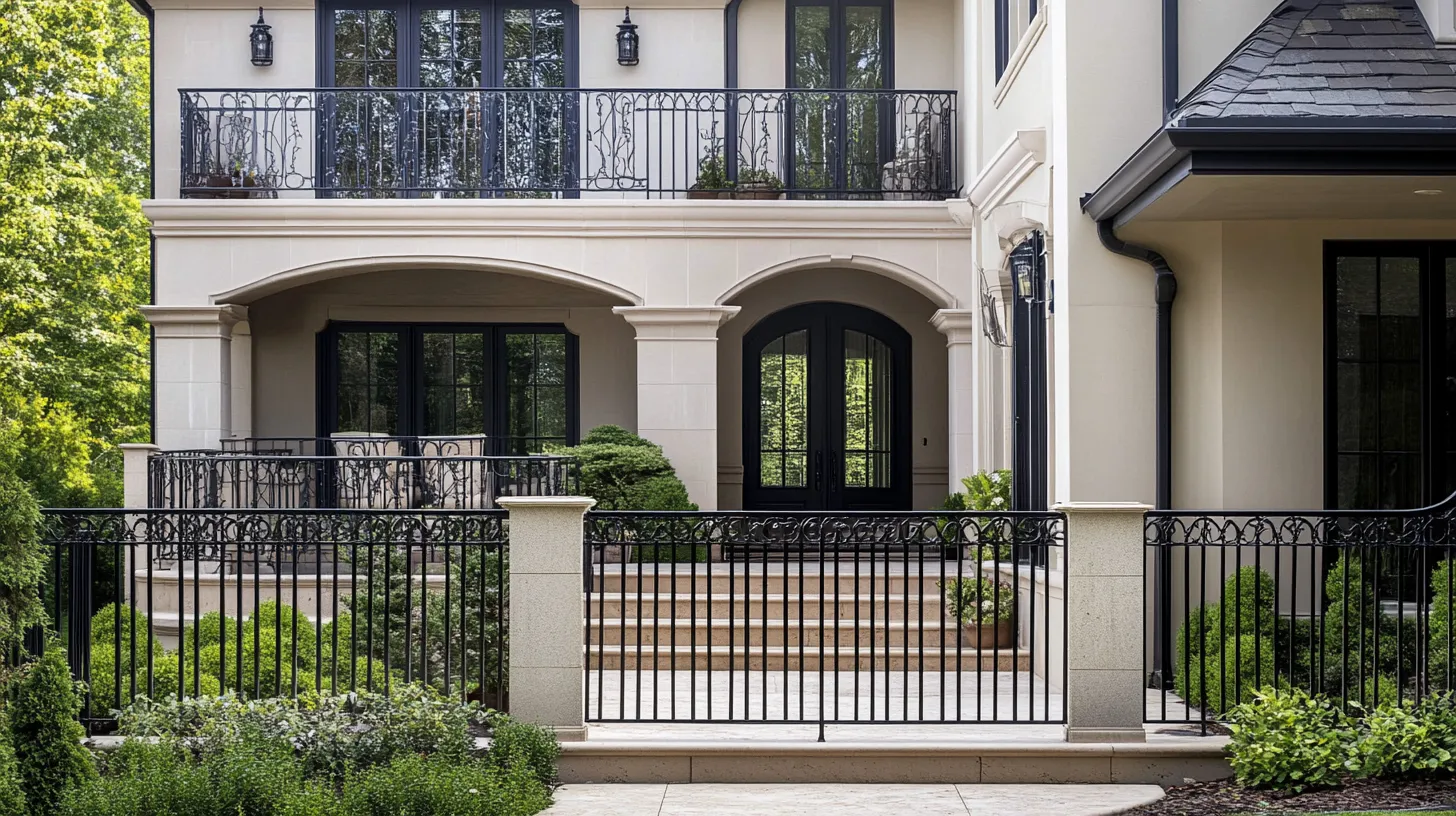
For structures with more traditional architecture, vertical railing designs give a conventional and classic aesthetic. These railings are often constructed out of wrought iron or wood and consist of vertical bars that are parallel to one another.
However, vertical railings can be constructed in various designs and combined with other materials like glass to create a distinctive and personalised aesthetic.
10. Rustic Railing Design
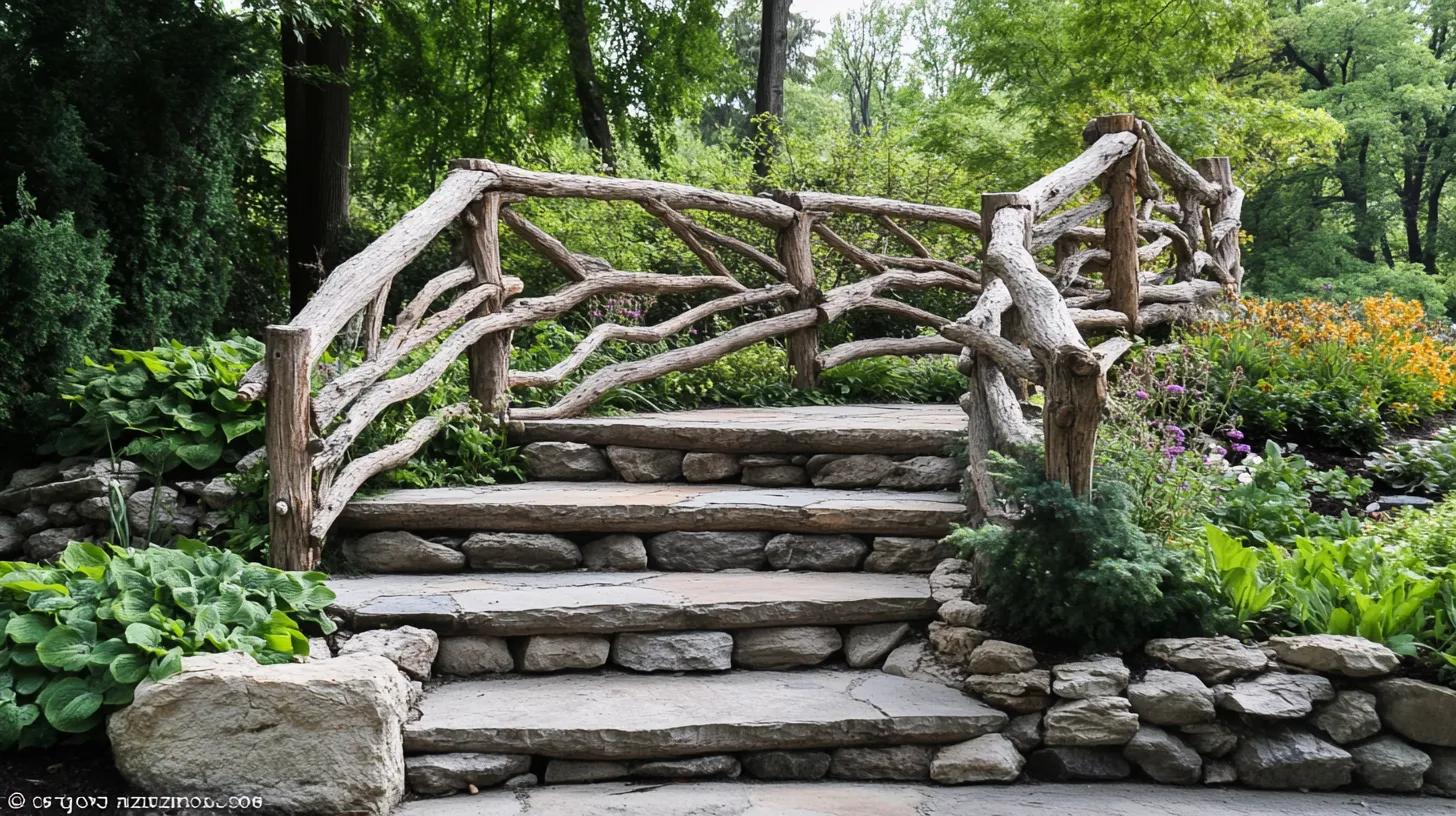
Buildings with a more natural and organic character will look great with a rustic railing design. Often constructed from materials like wood or stone, these railings are intended to seem old and used. However, rustic railings may be arranged in various designs and combined with other natural elements like plants or pebbles for a unified and organic look.
11. Zigzag-Shaped Railing Design
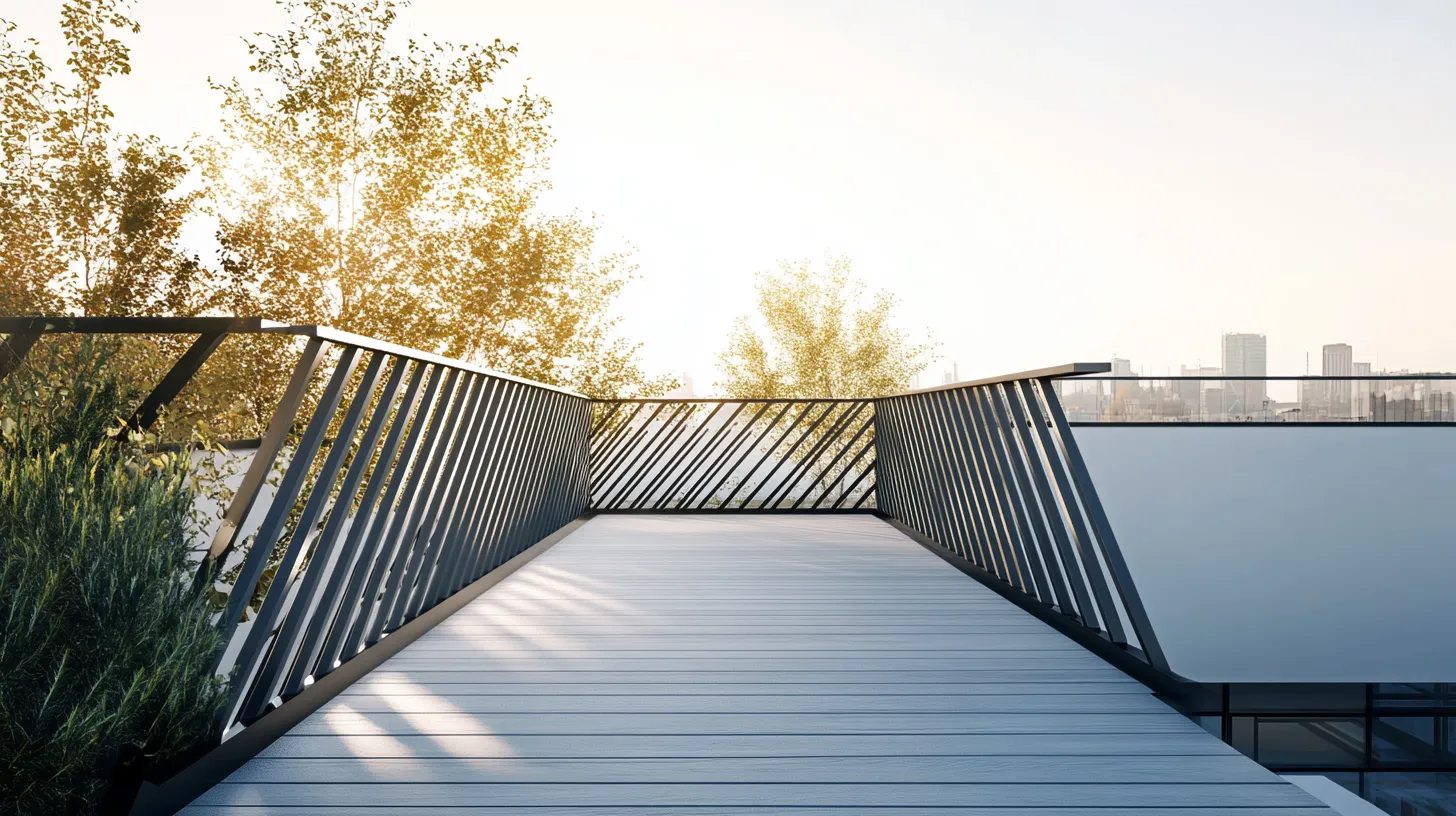
A zigzag-shaped railing design makes adding a touch of originality and creativity to a rooftop easy. These zigzag patterns are often constructed from steel or aluminium. These railings have an angular form that gives them a bold, distinctive appearance guaranteed to draw attention.
12. Black Glass Railing
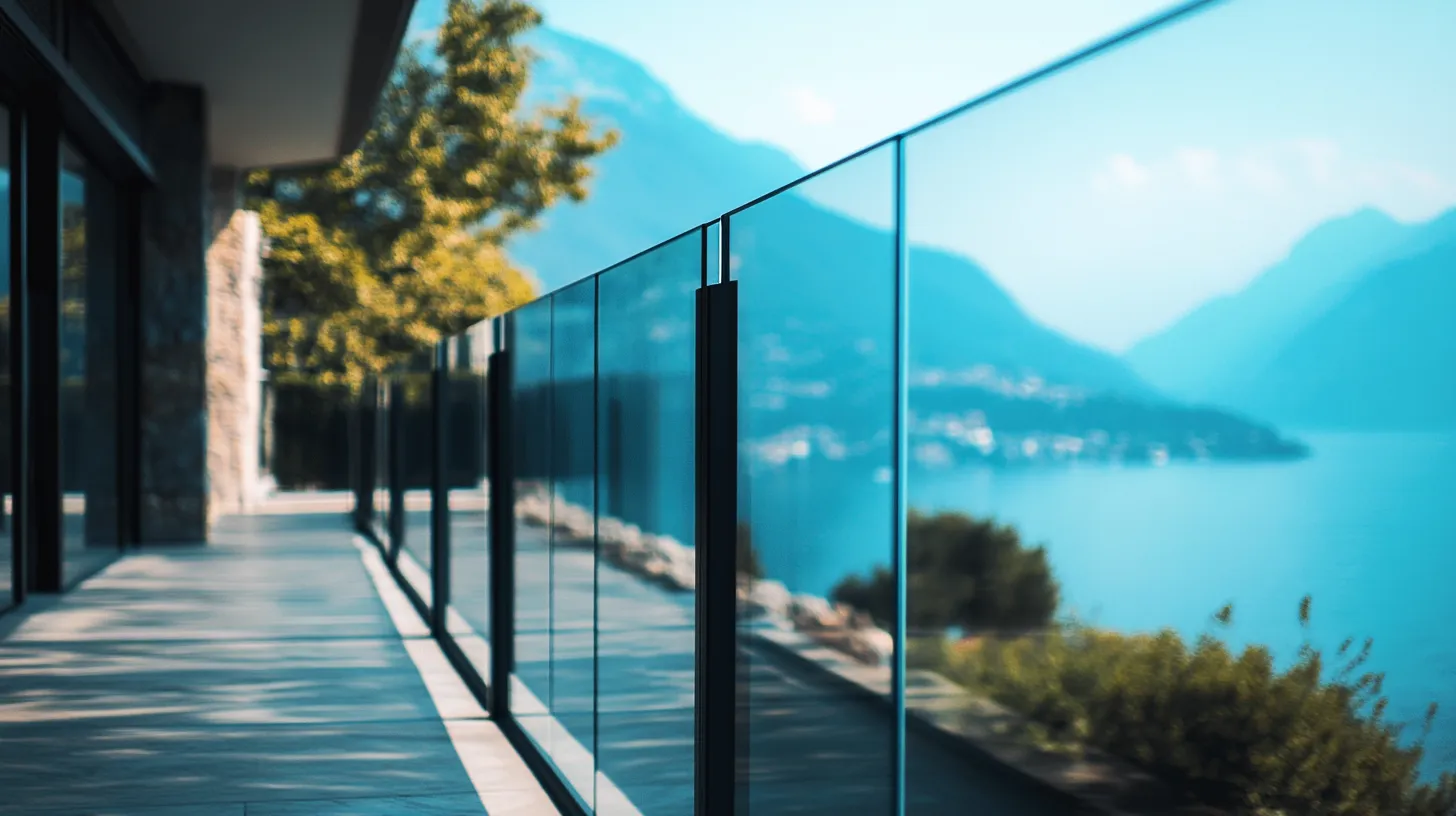
A black glass railing gives a posh, beautiful appearance ideal for modern structures. These railings are constructed from glass with a black tint, and their posts are frequently made of steel or aluminium. As a result, black glass gives off a sleek, contemporary appearance while maintaining an open view of the surroundings.
13. Bold Grill Railing Design
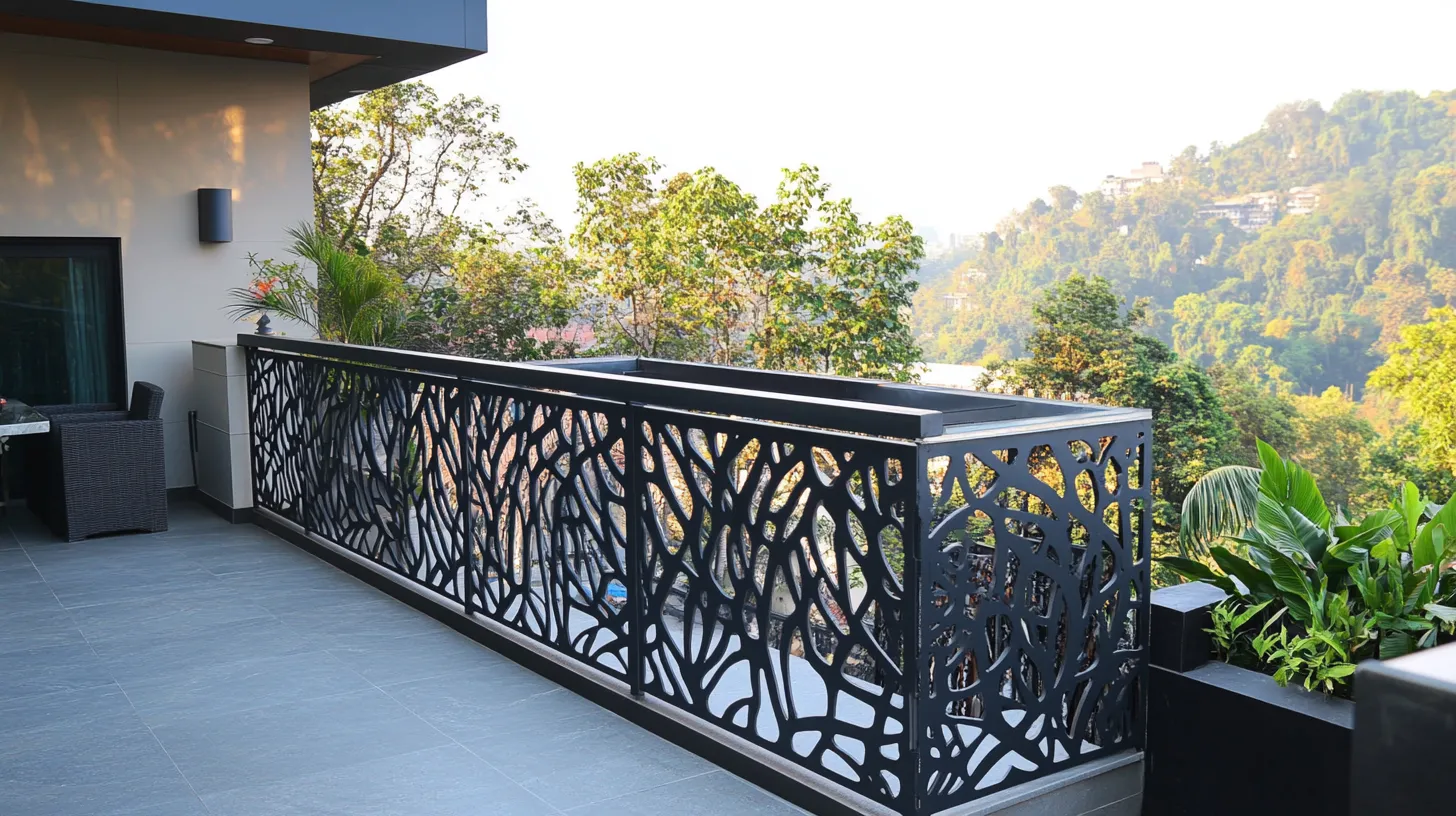
A strong grill design is a terrific way to give a rooftop a hint of industrial design. These railings are constructed of steel or aluminium grills with edgy and eye-catching designs. They can be powder-coated in various colours. For structures with a modern aesthetic, bold grill railings are ideal.
14. Industrial-Looking Railing
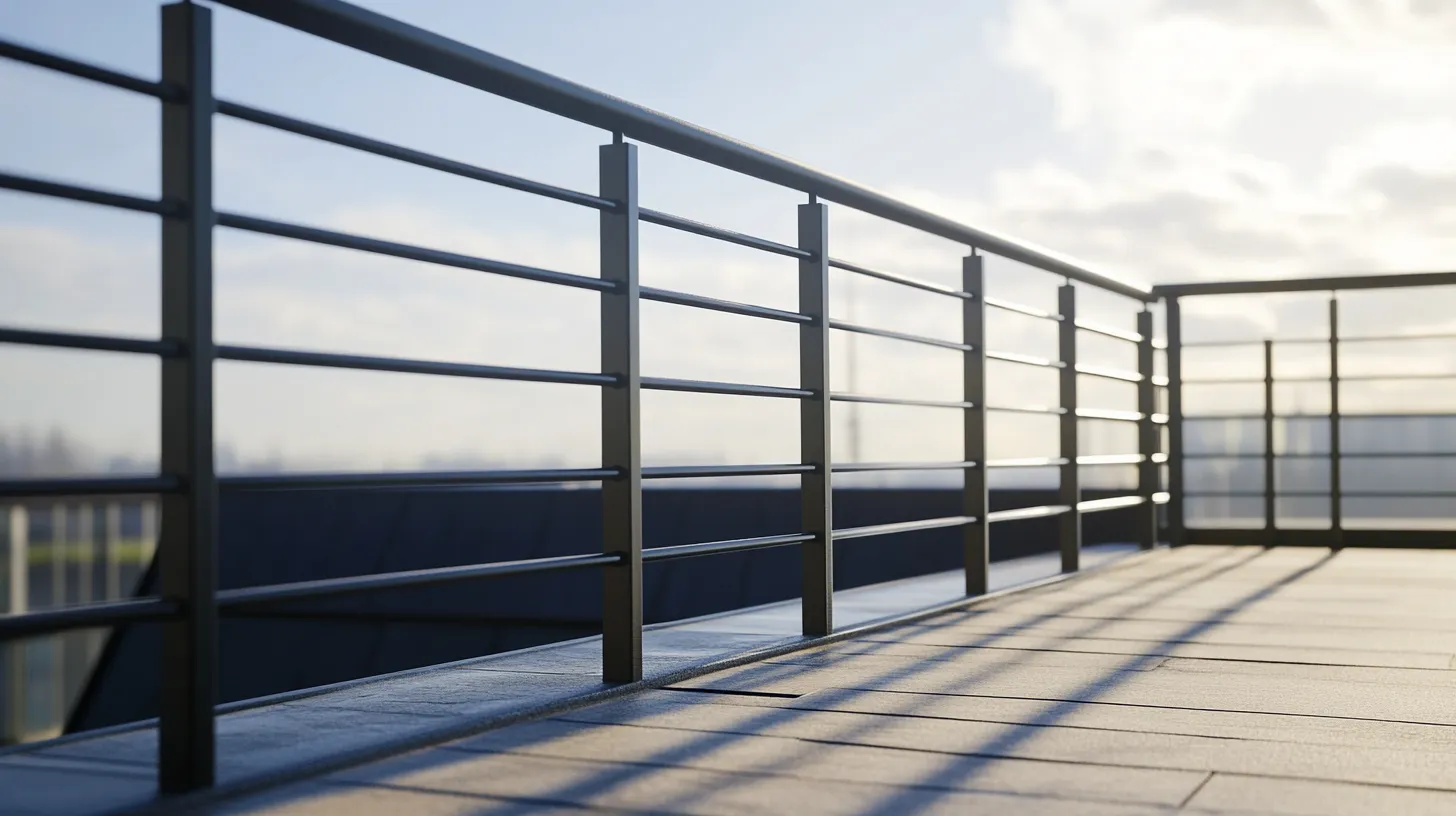
An industrial-looking railing gives a tough and practical appearance ideal for rooftops with a more rugged and unpretentious feel. These railings are created with a no-frills style and are composed of steel, iron, or aluminium.
These railings' industrial-style design gives a rooftop individuality and personality. In addition, they may be combined with other elements like wood or glass to make the space more harmonious.
15. Wood-panelled Railing
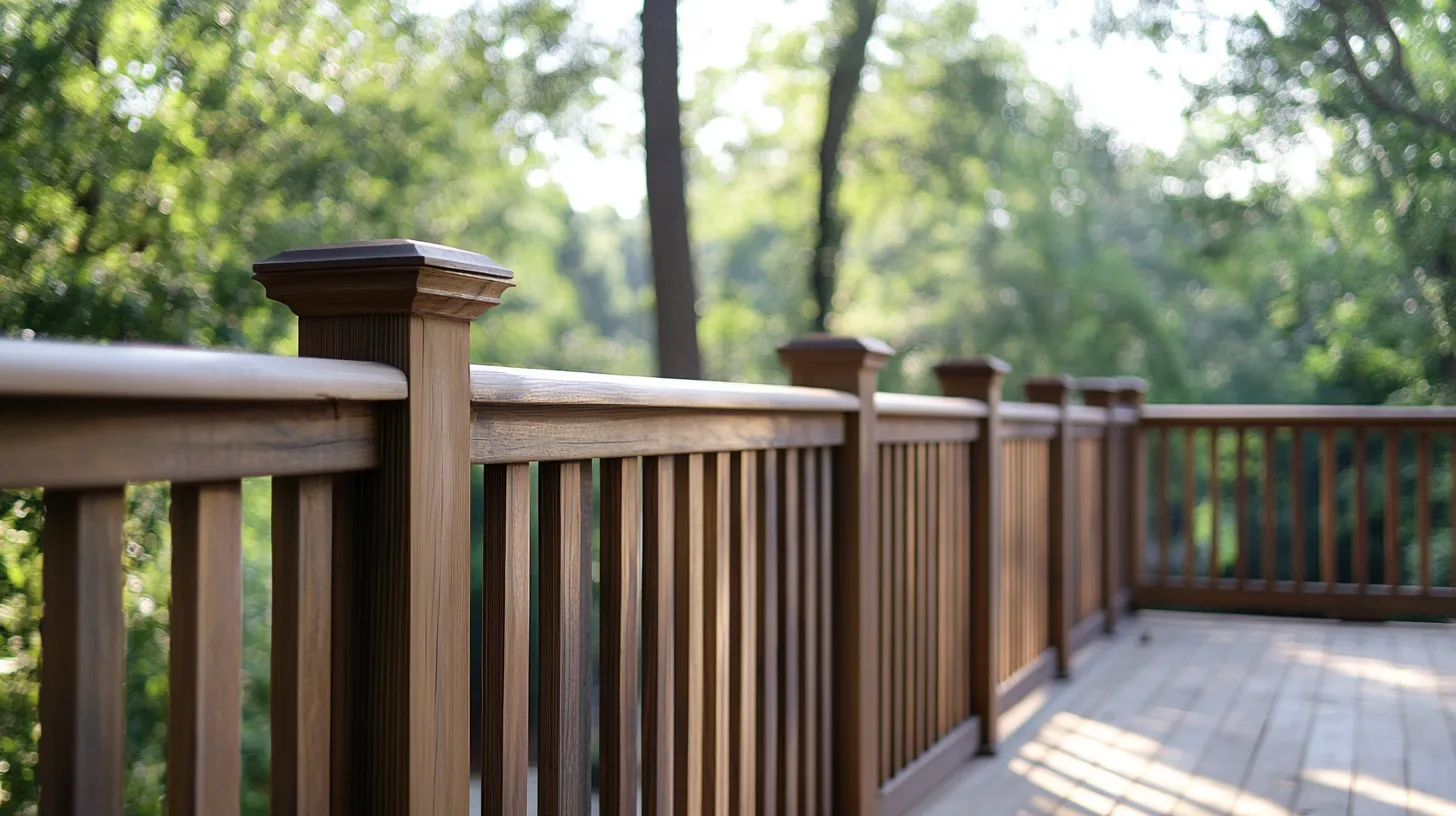
A wood-panelled railing design has a cosy, welcoming appearance that is ideal for rooftops with a more natural or rustic aesthetic. The wood panels that make up these railings often comprise cedar, redwood, or mahogany. The wood panels may be crafted in various designs and combined with additional elements like steel or glass to produce a more distinctive and tailored appearance.
16. Glass Panels with Wood Railing Design
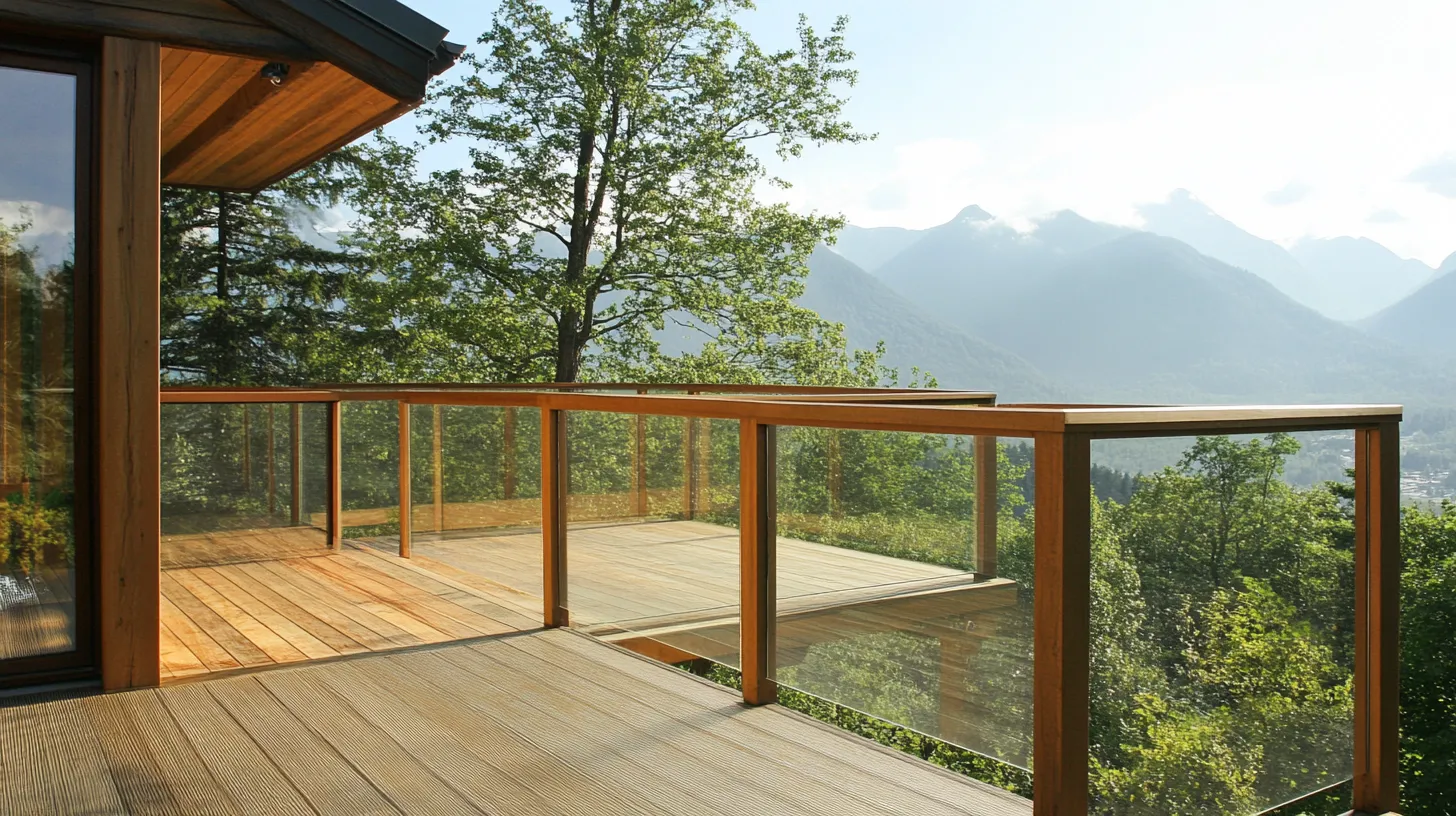
A glass panel with a wood railing design creates a contemporary and sleek appearance ideal for roofs with a beautiful outlook. Glass panels framed by wooden rails make up these railings.
Glass and woodwork work well together because they have a natural, organic feel. The glass panels also provide a clear perspective of the surroundings. For modern and contemporary structures with a more natural appeal, glass panels with wood railings are ideal.
17. Artistic Railing Design
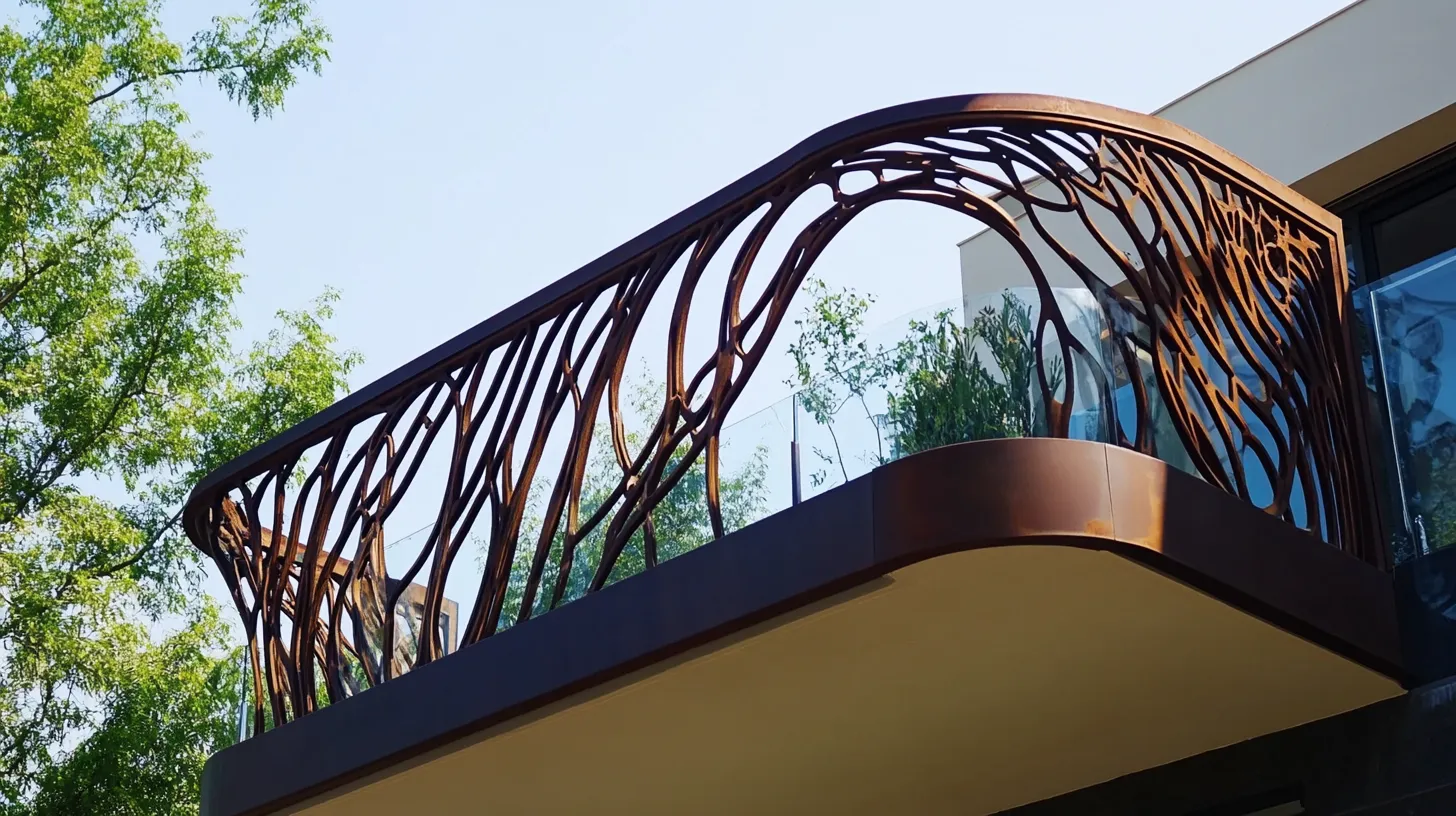
An artistic railing design contains distinctive and imaginative curves, forms, and patterns, providing the roof railing with visual flair and a dash of creativity. Metal, wood, and glass are just a few of the materials that may be used to create artistic railing designs, which can also be tailored to the demands and tastes of the building owner.
18. Ornamental Railing Design
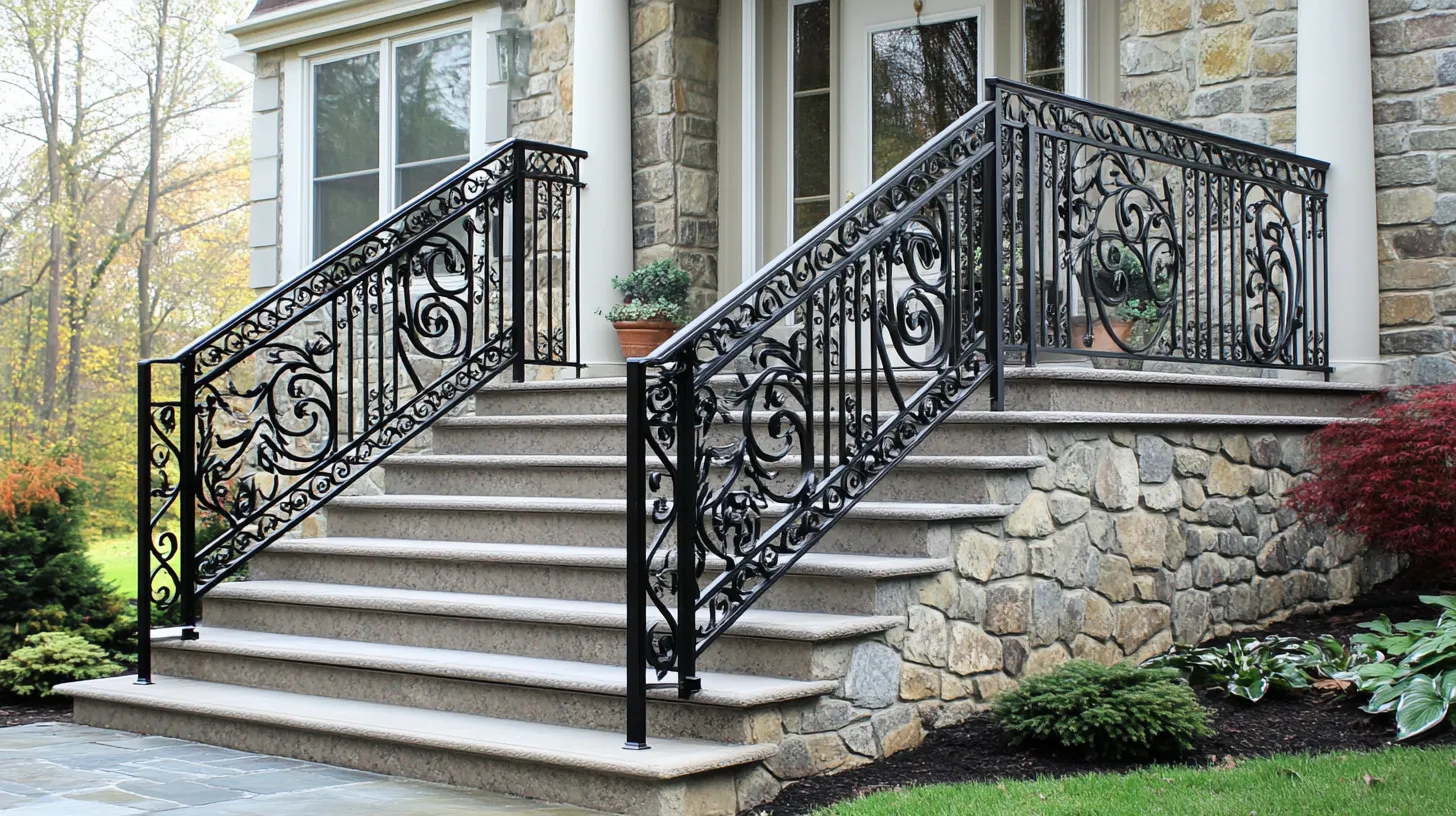
An ornamental railing design includes decorative components that are both aesthetically pleasing and useful. These patterns may be elaborate, floral motifs or other decorative features that give the roof railing a feeling of beauty and refinement. Wrought iron is a common material for decorative railing designs, although they may also be built of steel or aluminium.
How high should the railing be for the roof?
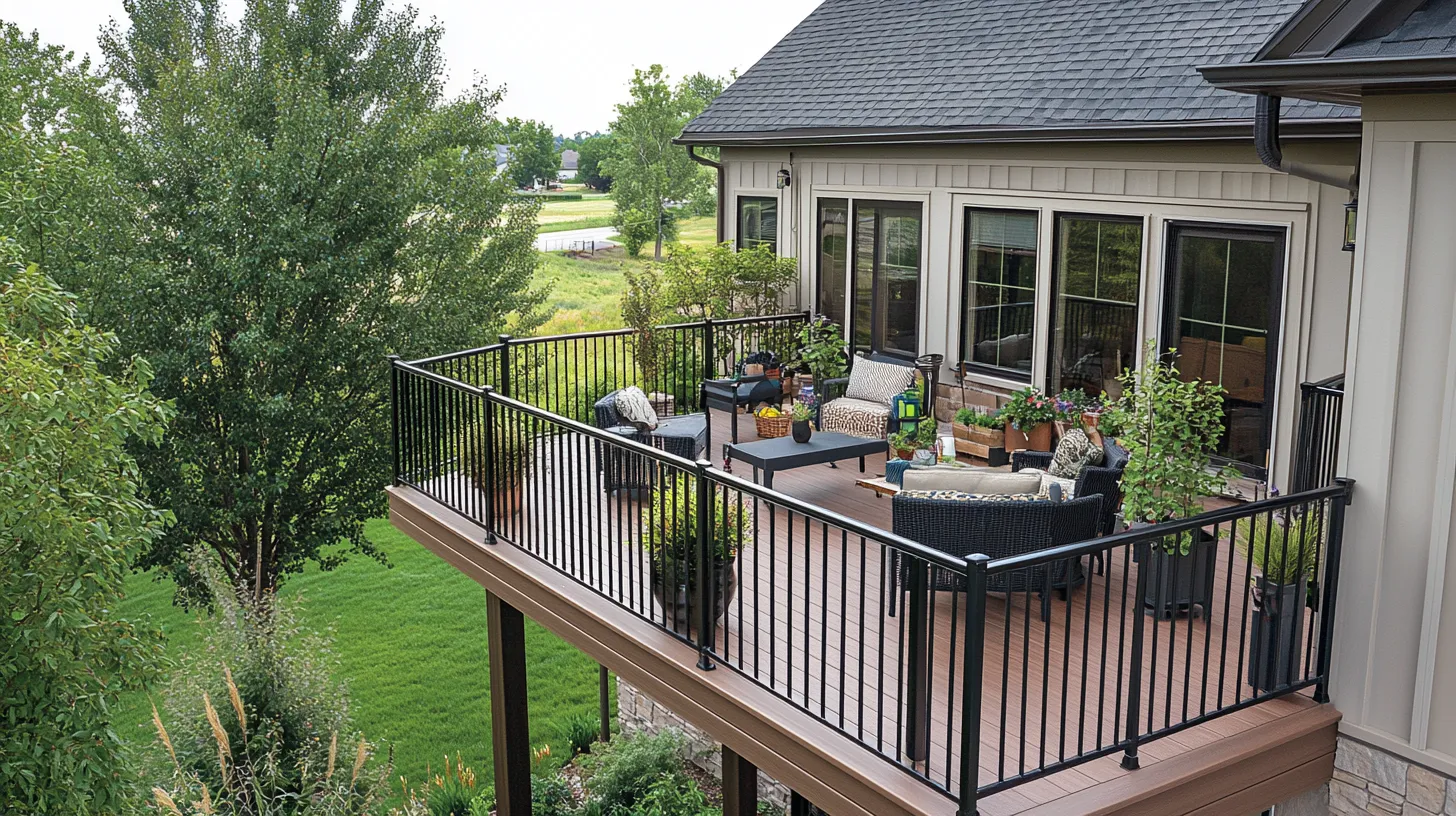
For safety and ensuring that construction codes are followed, the height of a roof railing is a crucial factor. According to the IBC (International Building Code) and other pertinent construction rules, a roof railing should typically be at least 42 inches (3.5 feet) above the roof's surface.
This minimum height requirement is meant to provide a difficult-to-climb barrier and prevent falls from the roof. Furthermore, the railing ought to be sturdy enough to resist a person accidentally knocking into it or resting against it.
It's important to remember that the precise height needed for roof railings may differ based on the building's location, usage, and occupancy. For instance, the height needed for roof rails may differ for a residential structure from a commercial one. The height requirement may also change based on the slope's angle if the roof has a slope.
It's also crucial to remember that building rules are only minimal standards and that some building owners and designers may decide to go above and beyond them for safety reasons. For instance, if people routinely access the roof, a building owner may install a railing taller than 42 inches to give an additional margin of safety.
What is the Minimum Railing Distance?
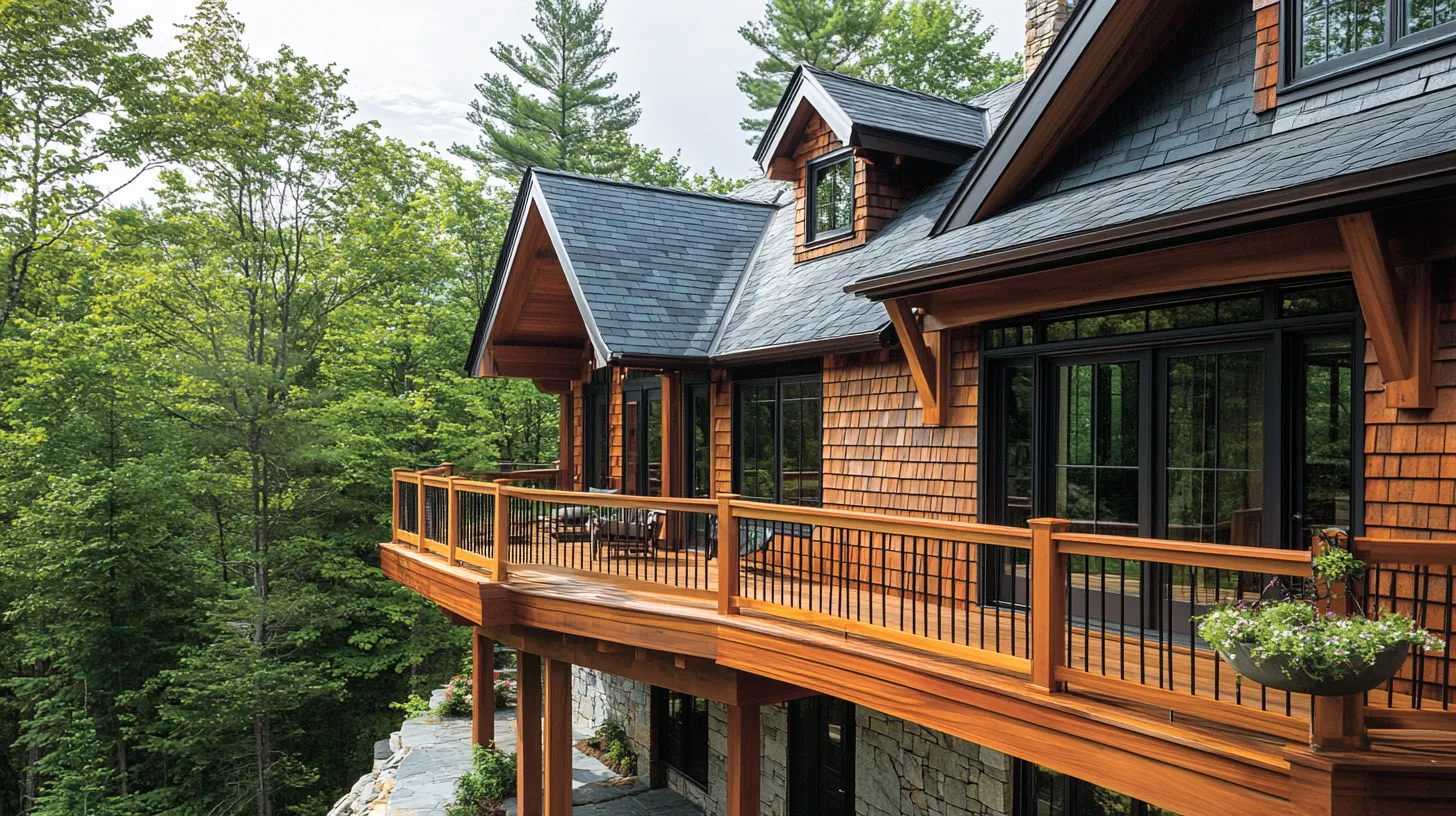
The distance between a railing system's vertical posts or balusters is the minimum railing distance, baluster spacing, or gap. Safety and adherence to construction codes both depend on the minimum railing distance.
For most Indian construction regulations, the minimum railing distance shouldn't be less than 4 inches (10.16 cm). This is because little children may fall through the railing if wedged between the balusters. Therefore this restriction is meant to prevent that from happening. Building rules could provide a lesser minimum railing distance for decks or balconies above the ground.
Building regulations are the minimum criteria. Therefore some building owners and designers may go beyond them in the interests of their projects. However, it's crucial to remember that building regulations are minimum standards and that some building owners and designers may go above and beyond these standards for safety reasons.
For instance, if the railing is situated in an area that kids or dogs regularly use, the building owner may construct a railing with a narrower spacing between the balusters to give an additional margin of safety.
The minimum railing distance may change based on the location and intended use of the railing system. For instance, the minimum specifications for a railing system on a commercial structure may differ from those for a residential one. Also, the material and form of the railing may impact the minimum railing distance.
A roof railing’s design must consider safety, practicality, and aesthetics. There are many different roof railing design options, such as wrought iron, horizontal and vertical patterns, zigzag-shaped, industrial-looking, wood-panelled, glass panels with wood designs, steel, cable, floral theme, curved stainless steel, Glass and steel, modern minimalism, and wrought iron.
Following applicable building requirements, it's crucial to consider the railing height when selecting a roof railing design and the minimum railing distance. However, building owners and designers may need more than these specifications to increase safety.
A well-designed roof railing may improve a building's aesthetic appeal while improving safety and security. Building owners and designers may choose the ideal roof railing design to meet their needs and tastes by selecting a broad selection of design alternatives. To know more, visit the NoBroker website.

